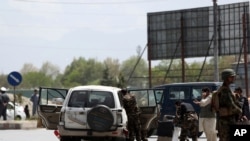The United Nations says the conflict in Afghanistan has killed and injured nearly 6,000 civilians during the first nine months of 2020, representing a 30% decline compared to the same period last year.
The report compiled by the U.N. Assistance Mission in Afghanistan (UNAMA) comes as direct peace negotiations between Afghanistan’s warring parties have been underway in Qatar since September 12, though without any progress.
Just hours after the world body released its findings Tuesday, a bomb went off in Kabul, the Afghan capital, killing at least three civilians and injuring 10 others.
UNAMA has documented 2,117 civilian deaths and 3,822 injures from January 1 to September 30, saying the war-ravaged country remains among the deadliest places in the world to be a civilian.
Child casualties during the reported period amounted to 31% of all civilian casualties, and women casualties 13%.
“While the number of civilian casualties documented is the lowest in the first nine months of any year since 2012, the harm done to civilians remains inordinate and shocking,” the report said.
UNAMA noted the outgoing month is outside of the scope of the report, but intensified battlefield attacks, a suicide bombing and an Afghan government airstrike together have killed and injured more than 400 civilians since October 1.
The report lamented that the ongoing Afghan peace process has failed to slow the number of civilian casualties.
“The peace talks will need some time to help deliver peace. But all parties can immediately prioritize discussions and take urgent, and frankly overdue, additional steps to stem the terrible harm to civilians,” said Deborah Lyons, the mission’s chief in Kabul.
The U.N. report blamed the Taliban insurgency and other anti-government forces for causing 58% of the civilian casualties. The Taliban were responsible for 45 percent of the total casualties. It noted, however, that the overall number of civilian casualties attributed to the Taliban dropped by 32%.
Taliban spokesman Zabiullah Mujahid rejected as propaganda the U.N. findings, saying they were founded on baseless reports shared with the world body by Afghan security and intelligence institutions.
UNAMA said pro-Afghan government forces were responsible for 28% of the harm inflicted on civilians in the first nine months and documented its concerns about the 70% increase in civilian casualties caused by Afghan Airforce airstrikes.
There was no immediate response from the Kabul government to the report.
“Our interviews with victims and their families reveal the near complete failure of parties to the conflict to acknowledge harm caused, nor even to make contact with them following an incident,” said Fiona Frazer, UNAMA’s Human Rights chief.
The report finds that in the period under review there were fewer civilian casualties attributed to the ISIL-Khorasan Province, the Afghan branch of Islamic State terror group, due to a decrease in the number of attacks.
The U.N. mission noted that harm caused to civilians by U.S.-led international forces “all but ceased in the reporting period,” attributing it to the landmark peace-building agreement the United States signed with the Taliban in February.
The U.S.-Taliban deal has bound the insurgents not to attack foreign forces committed to stage a “conditions-based” complete withdrawal from Afghanistan by May 2021. In return American forces have significantly scaled back military operations, including airstrikes, against the Taliban.
The pact requires the insurgents to negotiate a permanent cease-fire with rival Afghan groups and a political arrangement to govern the post-war country.
But both U.S. and Taliban officials have lately accused each other of violating the terms of the agreement and lingering disputes have slowed, if not stalled, the peace talks between the Taliban and representatives of the Kabul government being hosted by Doha, the Qatari capital.





